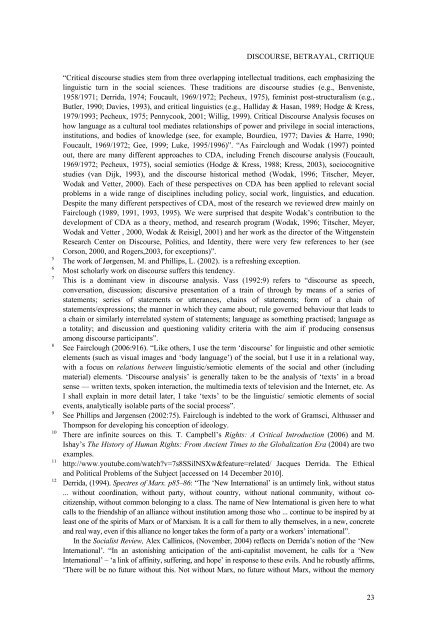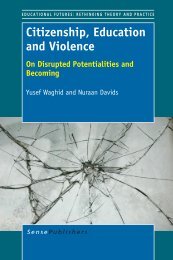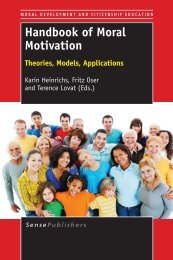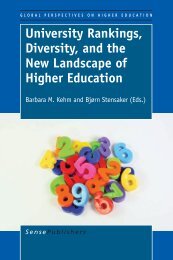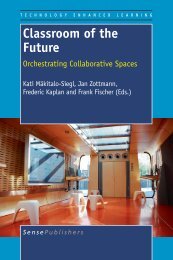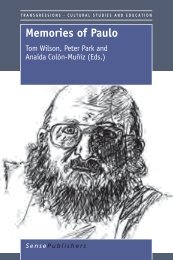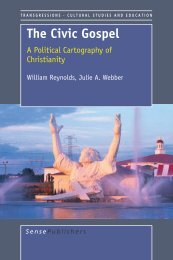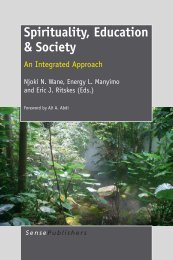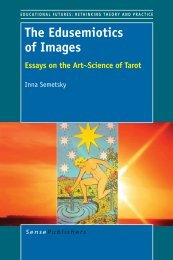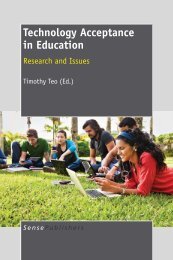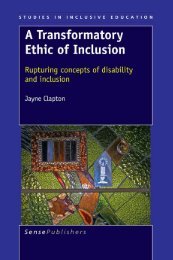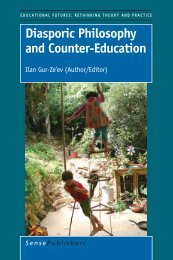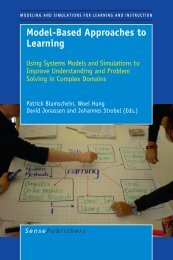Safe Spaces Human Rights Education in Diverse Contexts
Safe Spaces Human Rights Education in Diverse Contexts
Safe Spaces Human Rights Education in Diverse Contexts
You also want an ePaper? Increase the reach of your titles
YUMPU automatically turns print PDFs into web optimized ePapers that Google loves.
DISCOURSE, BETRAYAL, CRITIQUE<br />
“Critical discourse studies stem from three overlapp<strong>in</strong>g <strong>in</strong>tellectual traditions, each emphasiz<strong>in</strong>g the<br />
l<strong>in</strong>guistic turn <strong>in</strong> the social sciences. These traditions are discourse studies (e.g., Benveniste,<br />
1958/1971; Derrida, 1974; Foucault, 1969/1972; Pecheux, 1975), fem<strong>in</strong>ist post-structuralism (e.g.,<br />
Butler, 1990; Davies, 1993), and critical l<strong>in</strong>guistics (e.g., Halliday & Hasan, 1989; Hodge & Kress,<br />
1979/1993; Pecheux, 1975; Pennycook, 2001; Willig, 1999). Critical Discourse Analysis focuses on<br />
how language as a cultural tool mediates relationships of power and privilege <strong>in</strong> social <strong>in</strong>teractions,<br />
<strong>in</strong>stitutions, and bodies of knowledge (see, for example, Bourdieu, 1977; Davies & Harre, 1990;<br />
Foucault, 1969/1972; Gee, 1999; Luke, 1995/1996)”. “As Fairclough and Wodak (1997) po<strong>in</strong>ted<br />
out, there are many different approaches to CDA, <strong>in</strong>clud<strong>in</strong>g French discourse analysis (Foucault,<br />
1969/1972; Pecheux, 1975), social semiotics (Hodge & Kress, 1988; Kress, 2003), sociocognitive<br />
studies (van Dijk, 1993), and the discourse historical method (Wodak, 1996; Titscher, Meyer,<br />
Wodak and Vetter, 2000). Each of these perspectives on CDA has been applied to relevant social<br />
problems <strong>in</strong> a wide range of discipl<strong>in</strong>es <strong>in</strong>clud<strong>in</strong>g policy, social work, l<strong>in</strong>guistics, and education.<br />
Despite the many different perspectives of CDA, most of the research we reviewed drew ma<strong>in</strong>ly on<br />
Fairclough (1989, 1991, 1993, 1995). We were surprised that despite Wodak’s contribution to the<br />
development of CDA as a theory, method, and research program (Wodak, 1996; Titscher, Meyer,<br />
Wodak and Vetter , 2000, Wodak & Reisigl, 2001) and her work as the director of the Wittgenste<strong>in</strong><br />
Research Center on Discourse, Politics, and Identity, there were very few references to her (see<br />
Corson, 2000, and Rogers,2003, for exceptions)”.<br />
5<br />
The work of Jørgensen, M. and Phillips, L. (2002). is a refresh<strong>in</strong>g exception.<br />
6<br />
Most scholarly work on discourse suffers this tendency.<br />
7<br />
This is a dom<strong>in</strong>ant view <strong>in</strong> discourse analysis. Vass (1992:9) refers to “discourse as speech,<br />
conversation, discussion; discursive presentation of a tra<strong>in</strong> of through by means of a series of<br />
statements; series of statements or utterances, cha<strong>in</strong>s of statements; form of a cha<strong>in</strong> of<br />
statements/expressions; the manner <strong>in</strong> which they came about; rule governed behaviour that leads to<br />
a cha<strong>in</strong> or similarly <strong>in</strong>terrelated system of statements; language as someth<strong>in</strong>g practised; language as<br />
a totality; and discussion and question<strong>in</strong>g validity criteria with the aim if produc<strong>in</strong>g consensus<br />
among discourse participants”.<br />
8<br />
See Fairclough (2006:916). “Like others, I use the term ‘discourse’ for l<strong>in</strong>guistic and other semiotic<br />
elements (such as visual images and ‘body language’) of the social, but I use it <strong>in</strong> a relational way,<br />
with a focus on relations between l<strong>in</strong>guistic/semiotic elements of the social and other (<strong>in</strong>clud<strong>in</strong>g<br />
material) elements. ‘Discourse analysis’ is generally taken to be the analysis of ‘texts’ <strong>in</strong> a broad<br />
sense — written texts, spoken <strong>in</strong>teraction, the multimedia texts of television and the Internet, etc. As<br />
I shall expla<strong>in</strong> <strong>in</strong> more detail later, I take ‘texts’ to be the l<strong>in</strong>guistic/ semiotic elements of social<br />
events, analytically isolable parts of the social process”.<br />
9<br />
See Phillips and Jørgensen (2002:75). Fairclough is <strong>in</strong>debted to the work of Gramsci, Althusser and<br />
Thompson for develop<strong>in</strong>g his conception of ideology.<br />
10<br />
There are <strong>in</strong>f<strong>in</strong>ite sources on this. T. Campbell’s <strong>Rights</strong>: A Critical Introduction (2006) and M.<br />
Ishay’s The History of <strong>Human</strong> <strong>Rights</strong>: From Ancient Times to the Globalization Era (2004) are two<br />
examples.<br />
11<br />
http://www.youtube.com/watch?v=7s8SSilNSXw&feature=related/ Jacques Derrida. The Ethical<br />
and Political Problems of the Subject [accessed on 14 December 2010].<br />
12<br />
Derrida, (1994). Spectres of Marx. p85–86: “The ‘New International’ is an untimely l<strong>in</strong>k, without status<br />
... without coord<strong>in</strong>ation, without party, without country, without national community, without cocitizenship,<br />
without common belong<strong>in</strong>g to a class. The name of New International is given here to what<br />
calls to the friendship of an alliance without <strong>in</strong>stitution among those who ... cont<strong>in</strong>ue to be <strong>in</strong>spired by at<br />
least one of the spirits of Marx or of Marxism. It is a call for them to ally themselves, <strong>in</strong> a new, concrete<br />
and real way, even if this alliance no longer takes the form of a party or a workers’ <strong>in</strong>ternational”.<br />
In the Socialist Review, Alex Call<strong>in</strong>icos, (November, 2004) reflects on Derrida’s notion of the ‘New<br />
International’. “In an astonish<strong>in</strong>g anticipation of the anti-capitalist movement, he calls for a ‘New<br />
International’ – ‘a l<strong>in</strong>k of aff<strong>in</strong>ity, suffer<strong>in</strong>g, and hope’ <strong>in</strong> response to these evils. And he robustly affirms,<br />
‘There will be no future without this. Not without Marx, no future without Marx, without the memory<br />
23


